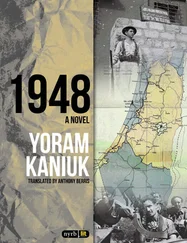At that time, a new official came who was more audacious than his predecessor, didn't spend time with young girls, but hated what he called those ignorant farmers with a blind hatred. He had big plans to bring ships up to Jerusalem to ram its wall and make it a big and fine open city, but nobody heeded his ideas. He came to the Land because he heard songs of a man who would sing in the cabarets of Jewish intellectuals in Poland and his name was Joseph Rayna. In Ha-Tsefira he read that the Crusaders had brought a ship up from Jaffa to Jerusalem and used it to ram the wall, he also read in a Russian newspaper that Jesus was then seen on the Mount of Olives, and after a week-long procession around the city, the wall fell. The official hired fifty Arabs who tried to bring a rotting Greek ship up from Ashkelon to Jaffa and from there to Jerusalem, but in Ramle, the Arabs ran away and because he was left without a ship and without employment, he was sent to the settlement that embittered the lives of the officials. He was chosen for that purpose by an official who met his orphaned comrade on his way from Jerusalem to Jaffa. He was so bored by the monotony of the road that he refused to look at it. The official heard Nehemiah lecturing at the community center on the citrus fruit that was to make the place flourish and discovered that, in litigation over the land of his hut, differences of opinion were revealed in favor of the Turkish side. He brought police from the splendid house of the Kamikam in Wadi Hanin and arrested Rebecca and Nehemiah and a few other people, put them in handcuffs, and took them to Ramle. Three Arab mukhtars, who had previously received a decent bribe, swore honestly that Rebecca Schneerson had whored with them in the fields near Hakhnazarea. The Arab mukhtars, who received a decent gift from a Sephardi Jew from Jaffa, who was urgently brought in a wagon hitched to four horses along with a drunk old German doctor named Dr. Kahn, tried to change their testimony, but were beaten in the courthouse and testified again what they had testified before. Rebecca looked straight at them, stopped weeping, sharpened her beauty, and they were filled with a fear that chained their body and they felt they couldn't move. Then, they opened their mouth and, in the eyes of the witch, they said: We were wrong, kill us, but we were wrong, that woman didn't whore with anybody, we lied. The big governor who came from Jerusalem didn't want to roil the waves and acquitted Rebecca. The Arabs were afraid but he also acquitted them. He delivered a venomous speech, but since he was tired and weary from a pleasant leave in Beirut, he delivered his speech in blunt words but with eyes shut with fatigue. He said that Zionism is a crime, that the Jews want to banish the masters of the Land, and why all of a sudden did they come to a land that wasn't theirs? Did they decide to crucify messiahs here again? he asked. Since most of those in attendance had no idea that the Jews had ever crucified messiahs they looked at the governor's moving lips with vague awe. The Jews, he said, were a superfluous people, wherever they were they caused trouble and wanted to start a world revolution. They are ruled by the El ders of Zion who sit in a secret house in Jerusalem and direct the world. They want to rule the whole globe, he said, and Rebecca woke him from his fantasies and said: Maybe the whole cosmos, but since he didn't understand the word and was very tired, he laughed. And when the governor laughs, all the Turks laugh too. Before he left, the governor told Rebecca: After all, that Jesus was also one of yours, and only Mohammed came in the desert and not from some hole of a Jewess. But then a rich man from the Jaffa center arrived with a Turkish modir, whose bribe amounted to a fortune and the matter was settled, and Nehemiah's lands were returned to him and he built a hut on the land, and the house that remained empty was turned into a chicken coop that Rebecca fixed up afterward.
Tape /-
To bring order into things, a famous tea agent was brought who would write fiery articles about Zionism as a spiritual center. And the wise old man, who was the first Jew who saw Arabs in the Land, wrote a fiery article and for the first time since Nehemiah killed prophets in his room at night, he hit a beloved and admired person. The matter was forgiven. People said that Nehemiah suffered enough when he saw foreigners vilifying his wife, who hadn't stopped weeping. A Jew from the committee argued with the agent and the official who wanted to bring a ship up to Jerusalem. They stood next to the well the official had taken for himself and distributed its water according to his own malice. He stood there wearing an officer's uniform unidentified with any known plan, a woman held a parasol over his head, but the argument ended to everybody's satisfaction. The water was transferred to the authority of the committee, the house was sold, and Nehemiah won the official tenancy of his house. One youth slaughtered himself at the well in torments of malaria. Those who came to his funeral were arrested and taken in handcuffs to Ramle. Rebecca saw a Turkish shavish approaching her as she went to visit Nehemiah, who was one of those arrested. After a hefty ransom was paid, they were all released. Rebecca didn't forgive the shavish who looked at her and lusted for her. When he approached her in the garden of the Russian church and tried to lift her onto the mare, she kicked him. He chased her to her house in the settlement. At the house Rebecca shot the mare and the shavish thought he had been shot himself and lay on the ground a whole day without moving. The fellow who slaughtered himself lay dead in the community center, and the men decided to cancel the excommunication of Rabbi Nathan and mark the plot of Secret Glory as a cemetery for the settlement. Horowitz said: If Yashka died (that fellow who committed suicide), we're all liable to die and it's impossible to bury everybody in another settlement, since we can't have one settlement all for the living and another all for the dead. And after they dug the first grave, they put a fence around the plot. Nehemiah delivered an excited speech about the torments brought by the purification of salvation and resurrection. Excited by Nehemiah's impressive words, the men sat and argued what to call the cemetery. The names "House of the Eternal" and "Cemetery" and "House of the Next World" didn't appeal to them. Nehemiah thought there was no need to give it a name. It's enough that we know, he said, that we'll be buried there. But Jews yelled and somebody suggested calling the place "Roots." Nehemiah said: Absolutely not. Anybody who calls his first cemetery "Roots" calls the Jewish state that will rise here "Hill of Graves" and that's forbidden. But his words fell on deaf ears and the name remained.
The official left one day and didn't come back. The synagogue was renovated and was once again a place for prayer. The citrus fruits were also planted and flourished. The new authority was more enlightened. The Turks were busy with the Young Turks' revolution and were bound by secret letters that would come in the middle of the night from anonymous and veiled emissaries. Nehemiah again gave speeches in the community center and in Roots. Rebecca didn't stop weeping, and between her and Nehemiah grew Ebenezer. The Turks, who were waiting for the end of the revolution, said: The Jews will kill each other all by themselves and that will save us gallows and expensive bullets. From pogroms we came, Rebecca told Ebenezer, who didn't yet understand the meaning of the words, and to pogroms we shall return. Between the speeches, Nehemiah had to fertilize, chop, plow, and sow. He was delicate and fragile. The climate of the Land was hard for him, and he struggled with it in a silence produced by a lover's envy. The farmers did win a certain freedom but still felt like slaves. In Nehemiah's house, Rebecca's depressed spirit prevailed and a foolish child got underfoot. The drought that year was worse than the last year and some of the new citrus groves died, but in the winter the new saplings that had been planted grew as high as a child and the rain came in time and then came the Bedouins and started grazing their flocks on the young saplings. When the farmers resisted the Bedouins, they attacked at night. The Arab guard ran away and appeared the next day accompanied by Turkish police and asked for the money he was owed. Within a few days, the area was devoured by the black goats. The carts that went to the distant fields were attacked by the friends of the guard who didn't get his gold, even though the Turks got what was coming to them to ignore the place. One day the young farmers hid in the cart, with sticks in their hands, covered themselves with straw and sacks, and when they were attacked by the Bedouins, they burst out of the cart, about twenty of them, and beat the Bedouins roundly. The next day, Nehemiah made a long speech into the night: our force is our reply, he said, blow for blow.
Читать дальше












